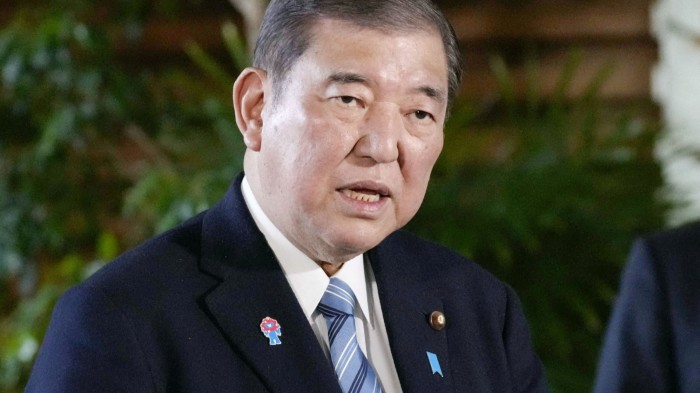Unlock the Editor’s Digest for free
Roula Khalaf, Editor of the FT, selects her favourite stories in this weekly newsletter.
In the unfolding drama of global trade tensions, Japan once again finds itself a target of US pressure. But unlike in the 1980s, when the conflict centred on a rising US trade deficit fuelled by Japanese exports of cars and electronics, today’s stakes are far more complex.
Back then, the lines were clear and China remained largely outside the frame. Now, Japan finds itself caught precariously between two rivals, each demanding its loyalty.
Extreme volatility in Japanese equities in recent days has been driven by alternating waves of optimism and disappointment. A phone call between Prime Minister Shigeru Ishiba and US President Donald Trump on Monday sparked hopes of a breakthrough in tariff negotiations. And top US trade officials are preparing to launch formal negotiations with Japan, signalling a potential shift towards de-escalation in trade tensions. But a strengthening yen is weighing on exporter sentiment, tempering broader market enthusiasm and adding another layer of uncertainty to the outlook.
In contrast to its strained dynamic with China, the US’s relations with Japan have remained largely co-operative. But Japan is in an increasingly uncomfortable position. Economically, it is deeply tied to China — its largest trading partner, particularly for high-value exports such as machinery and electronics. Yet strategically, Japan remains firmly aligned with the US, its most important security ally.
About half of Japan’s chip manufacturing equipment exports went to China in the first quarter of last year, when demand for artificial intelligence chips was surging. In August, those exports surged by more than 60 per cent, according to official data. Machinery, much of it related to chip production, accounted for nearly a quarter of Japan’s total exports to China, according to market data provider TrendForce, highlighting how deeply Japan is embedded in China’s manufacturing supply chain.

Balancing these interests is becoming more complex. Washington is pressuring Tokyo to restrict technology exports to China, including advanced chipmaking equipment and related components. As US-China tensions deepen, Japan is being forced into difficult choices: resisting demands could jeopardise its strategic alliance with Washington, while conceding could strain its economic relationship with Beijing.
The local economy is also more fragile now, making it particularly sensitive to external pressure. As a major car exporter to the US, even modest tariffs on cars or auto parts could dent corporate earnings. Unlike China, where the government can stimulate demand and absorb trade shocks more effectively, Japan has spent decades in a low-growth, low-inflation environment, leaving policymakers with far less flexibility.
Japan’s position as a strategic hinge between the US and China means markets will remain hostage to headlines, leaving fundamentals sidelined and volatility the new norm.
june.yoon@ft.com


